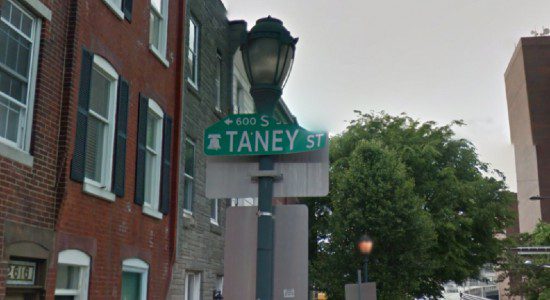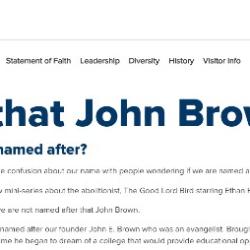“I just bought a house just past Girard in Brewerytown, and I took a walk around the street and I ran smack into Taney Street. I was just like, ‘There’s no way that this is named after who I think it’s named after.'”
But it was, and it is.

This Philadelphia street was named Minor Street until 1858, one year after Chief Justice Roger B. Taney wrote the Dred Scott decision, clarifying that the pre-Reconstruction Constitution was explicitly white supremacist, enshrining democracy for white men and autocracy for everyone else. Taney wrote that Black people were “altogether unfit to associate with the white race, either in social or political relations; and so far inferior, that they had no rights which the white man was bound to respect; and that the negro might justly and lawfully be reduced to slavery for his benefit.”
That’s the ideology that the city of Philadelphia sought to honor by naming a street after the guy, which is pretty gross.
I suppose, though, that it’s somewhat reassuring to realize this happened in 1858 rather than in 1878. That makes it an artifact of antebellum America — the formally, legally race-defined semi-democracy based on a Constitution that enshrined the Herrenvolk mentality of Taney’s racist screed. William Lloyd Garrison was absolutely correct to refer to the antebellum Constitution as a “covenant with death” and an “agreement with Hell.” It was, as he said, “the source and parent of atrocities,” fully deserving to be consigned to the flames.
And it was, eventually, burned to ashes and wholly rewritten, top-to-bottom, start-to-finish.
We tend to describe Reconstruction in less sweeping terms because, after all, the Constitution wasn’t scrapped and re-written, merely amended with three additions. But those amendments didn’t add new features so much as they transformed the entirety of the existing document. They took the prior Constitution and said, “This — but for everybody this time.”
Unlike the bounded forms of democracy and rights and the rule of law from the earlier Constitution, this was truly something new. This would redefine American nationality — in every sense — as a matter of those ideals wholly distinct from racial, ethnic, or religious homogeneity.
Alas, the new birth of freedom enshrined in the Reconstruction Amendments did not come with any formal enforcement mechanism. Almost as soon as the ink was dry, the sole participants in the bounded democracy of the prior agreement with Hell set about trying to delegitimize and defang and dismiss those amendments. They immediately began writing and enacting laws that were obviously and explicitly in violation of the new Constitution, and seeing those laws upheld by courts still committed to the stunted, exclusive notion of rights expressed in Taney’s statement above.
And that lawless rolling back of Reconstruction and of the re-written Constitution continued for the next century, unchanged and unchallenged.
So a monument to Taney established in 1858 serves as a depressing relic of the vile racism that shaped the first generations of America’s very limited experiment with partial democracy. Had the street been renamed in 1878 instead, then that name would be an even more depressing reminder that this ideology of racist, partial democracy still endures even after it lost a war and its legal basis was retroactively abolished from the Constitution.
Which is part of why there is still a Taney Street in Philadelphia, honoring the enduring legacy of the man who decreed that Black people have no rights that white people are bound to respect. (That was also, roughly, the campaign slogan that got Frank Rizzo elected mayor of Philadelphia twice.)
The quote at the top of this post is from a WHYY report in December tepidly titled “Should Philadelphia rename Taney Street?” That’s Philly resident Samaya Brown reflecting the unanimous opinion expressed by everyone interviewed in the piece. An accurate, use-words-to-say-what-you-mean version of the headline for that article would have read “Philadelphians demand a new name for Taney Street.” Or “Council members, bureaucracy, stymie citizens’ effort to change racist street name.”
The current proposal — unopposed, publicly at least — is to change the name to LeCount Street in honor of Caroline Rebecca LeCount, a civil rights pioneer and longtime educator. (LeCount was also engaged to voting rights activist and baseball player Octavius Catto until he was assassinated on Election Day in 1871 as part of the white terrorist effort to prevent the new Constitution from ever being enforced.) You can read more about LeCount here.
LeCount Street is even better than the idea I had for renaming the street, changing it to Scott Street in honor of the human, American person who had the courage to sue the government to force rat-bastards like Taney to contend with him as a human and as an American, despite their determination to treat people like things.
As Kathryn Rubino wrote recently, “This Supreme Court Justice Absolutely, Positively Should Not Have A Street Named After Him: Get it Together, Philly.”
Until Philly gets it together and changes the name to LeCount, I’ll continue to refer to it as Scott Street. Hence the Phoebe Bridgers lyric in the title to this post. I love that song because its lovely concluding refrain is one of the best pieces of advice you will ever receive: “Anyway, don’t be a stranger.”












